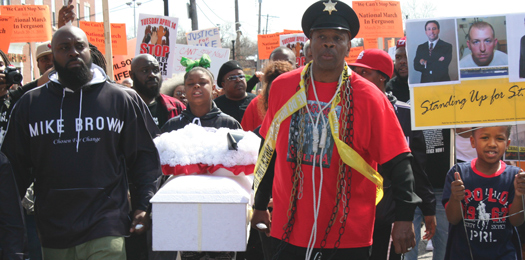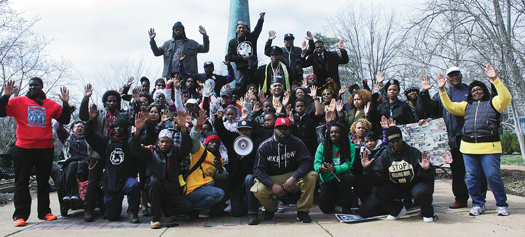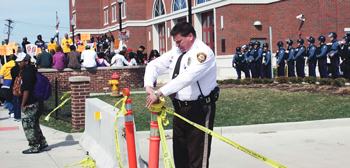National
Protestors Condemn White Minority Rule, Modern Apartheid in the St. Louis Area

|

Michael Brown, Sr., right, and activist Anthony Shahid lead a protest in Clayton, Mo., the seat of government for St. Louis County. (J.A. Salaam/The Final Call)
|
Special to the NNPA from The Final Call
FERGUSON, Mo. (The Final Call) – White minority rule in South Africa in 1960 resulted in Black youth getting gunned down by police officers while White minority rule in Ferguson, Mo., and an entrenched White power structure is connected to the shootings and targeting of Blacks and Black youth in the St. Louis metropolitan area, said activists during a recent weekend of protests.
Demonstrations over the March 20-21 weekend coincided with the 55th anniversary of the Sharpeville Massacre in South Africa and hundreds of protestors journeyed to Ferguson and Clayton, Mo., to continue demands for justice linked to the shooting of unarmed Black teenager Michael Brown, Jr., last summer and a Justice Dept. report condemning systematic targeting of Blacks by police and essentially a city government that extorted money from Black residents through the police department and the courts.
The Leadership Coalition for Justice and several other groups organized the National March on Ferguson with the theme “We Can’t Stop Now!” The first day of protest was a Friday gathering March 20 with people, some from across the country, gathering in Shaw Park in Clayton, Mo., the seat of county government and offices for the county attorney who failed to indict officer Darren Wilson for the shooting of Michael Brown, Jr.

Hundreds of protestors took part in demonstration in Clayton, Mo., and Ferguson, Mo., over the March 20 weekend. (J.A. Salaam/The Final Call)
|
Among those protesting was the young victim’s father, Michael Brown, Sr., who marched, chanted and shared a few words. “We showed up and out this weekend and I’m happy to see all the support out here, this means a lot, thank you,” he said.
“I’ve been out here marching with the organization Leadership Coalition For Justice for two days in Clayton and Ferguson, Mo., but this weekend means even more because it marks the 55th anniversary of the Sharpeville Massacre, which was an incident that happened in South Africa where several youth activists decided that they were going to refuse to carry their passes during apartheid in South Africa,” said Nadeehah Azeez, a St. Louis resident who joined the protests.
“Because they were refusing to carry their passes they all left their homes marched down to the police station to turn themselves in for violating the law there. And while all these youth were out there marching, peacefully protesting, they were very intentional about being peaceful and non-violent. The police officers got nervous, someone pulled the trigger and 69 of those children ended up getting killed and several others were injured,” she said.
“We are here today because we stand in solidarity with those people who lost their lives in South Africa and we stand in solidarity with all of the unarmed Black men, women and children who have lost their lives here in the United States of America and in St. Louis,” said Ms. Azeez.
Protestors shut down and diverted traffic on a main expressway in Clayton and disrupted the flow of business in the county seat. Several municipal police departments were dispatched to help with traffic and crowd control.
The next day March 21, demonstrators joined a Saturday march on the Ferguson police station. Several hundred people carried signs, placards, chanted and called for the resignation of Mayor James Knowles and federal oversight of the police department.

Police officer ropes off area in front of Ferguson police department headquarters during March 21 protest. (D.L. Phillips/The Final Call)
|
At the Saturday rally, activist Anthony Shahid of the Leadership Coalition for Justice told the crowd that Clayton police tried to plant a gun on Larry Miller, who spoke at the protest. “Listen up brothers and sisters, pay attention because you don’t know these wicked people, you are not paying attention to what I’m saying. I’m telling you they wanted to plant a gun on a brother yesterday in Clayton but got caught and it’s on video,” said Mr. Shahid.
“After the rally we walked around to where my car was parked. But one of the protestors in a wheelchair was catching the Metro train and our motto is leave no one behind so we stayed until she got on. Afterwards we drove off the lot so I can take Ralph to his car and noticed we were being followed by the police. We made several turns to the right, left and so on. When we got to his vehicle they pulled me over,” said Mr. Miller. “He said I made an illegal U-turn but it was not posted. I gave him my license and insurance card, by that time we were surrounded by four more police cars. I never experienced anything like this for making a supposed to be illegal turn.
Anyway, he came back to the car he said ‘can I speak to you a minute or do you want me to say it in front of these guys?’ I said, it’s okay these are my protest buddies, but I decided to get out the car and step to the back. He told me someone said they saw me put a gun in my waistband, is there any weapons in that car can we search that car? I said, ‘Sir, I’d rather you tell me the truth than to stand here and tell me a bold-faced lie. That’s an insult to my intelligence, we been protesting over 220 days do you think we are that stupid to bring a gun to Clayton, really sir? Don’t paint us with the same paint brush you put on the young man in Ferguson concerning the police who got shot.’
“Just like I don’t paint all cops as bad I don’t think you should do that to us, and as I was speaking with him someone yelled out, ‘You got a gun in your boot. What are you getting ready to do with that gun?’ The officer didn’t deny he didn’t have anything, instead he just started moving back and hiding it, but (we) filmed it. Then they let us go when I told the police officer that he cannot do anything to the passengers in my car if nothing is wrong with me as the driver, then they let us go.”
“I grew up in Kinloch, Mo., which borders Ferguson. The main reason I’m out here is after the murder of Mike Brown it brought back a lot of memories because every person in Kinloch had some type of negative moment in Ferguson. When I was 11-years-old walking down the street … just going into Ferguson to get an ice cream cone, two White men in a car threw a cup of piss on me and I never got over that. So I’m out here not only to get justice for Mike Brown and to end police brutality from this racist community, but I’m trying to get some satisfaction for myself for the injustice that was done to me as a kid,” said 62-year-old Larry Lewis.
“This weekend was something magical, you got a chance to see the Muslim brother, the Black Panther brothers, a lot of other spiritual religious people coming together for one cause and move with one voice and one sound. A lot of things was a little bit different because we let our elders take the lead, you know usually the youth is taking the lead but they led us to some good things this weekend,” said Marcellus Buckley, 23.
“But where we go from here is hard to say, because everyone is saying we need officials in but at the same time we feel that the whole system is guilty as hell. We say, ‘indict, convict, send that killer cop to jail, the whole damn system is guilty as hell,’ ” he chanted.
Mr. Shahid said the county executive refused to coordinate a simple stage and sound system for protestors with the mayor of Ferguson, who is trying to improve things. That means there is no respect for free speech from Steve Stinger, whose office is in Clayton, Mo., said the activist.
In a telephone interview, Mayor Knowles told The Final Call, “We committed to helping the organizers with their protest.” There are two stages and the county stage was the only one available, he said. But, the mayor added, that he was told to make a personal request to Mr. Stinger. My request was turned down, the county executive had no interest in doing anything with the protestors, said the mayor. “I told Mr. Stinger every time I work with (Min. Abdul Akbar Muhammad) or Shahid the outcome has always been positive. Mr. Stinger responded he did not like the idea of people being on a stage that has St. Louis County name on it and talking negatively about people,” said the mayor, who has been under pressure to resign.
The mayor said he told Mr. Stinger, “I would rather they be on the stage in the park than in the middle of the street.”
Democrat Stinger has a problem with the leaders of the coalition and me, and the county exec promised efforts to promote racial healing while running for office but isn’t living up to it, said Mr. Shahid. Clayton is a very affluent area, has Whites in power with few Blacks holding positions and they do not believe a problem exists, Mr. Shahid said. We plan continue to pressure him, vowed the veteran activist.
In these small municipalities in St. Louis County, not just Ferguson, young Black men are targeted and can face warrants and fines from multiple jurisdictions at the same time, said Mr. Shahid. We want a consent decree for the 88 area police departments under one authority and a civilian review board with subpoena power, he said. You can’t have the county police oversee Ferguson, he said.
We also want the police department, fire department, city officials to look like the residents of the majority Black communities, Mr. Shahid said. “We can’t win with these conditions,” he added.
There must be inclusion of Blacks in construction work so Blacks can make a living as tradesmen and not be blocked by trumped up arrest and conviction records, continued Mr. Shahid. The same people who got the world’s attention are not being given work and the insurance companies are hiring Whites for demolition and construction, he said.
“That’s a problem. We don’t want nothing built or torn down there unless Black folks are there,” Mr. Shahid said.
Activists David Royal and Tory Russell are working to get people out to vote and stress how important voting was 50 years ago and today, he said. If we elect people, the newly elected officials can appoint the police chief and mandate that Blacks be included in the rebuilding effort, he said. “How can we talk about bringing crime down and racial harmony and we don’t have anything?” asked Mr. Shahid.
Race relations could be better but the county executive isn’t setting the right tone for racial healing, said Mr. Shahid. He pointed to an article in the St. Louis Post Dispatch that has contributed to the targeting of volunteer Jana Gamble, a production assistant with a local TV station, who helped during days off over the weekend. Social media has been full of attacks and insults lobbed at the young woman, who said in an initial post that her desire was to work with everyone and get justice for everyone.
Mr. Stinger only wants to work with a select group of Black people, not everyone as he said while running for office, said Mr. Shahid. “We have to stay out there in Clayton,” said Mr. Shahid. “They are not trying to sit down with us and work with us. This thing is far from over and if anything it’s just starting now.”
Mr. Shahid also wants to boycott St. Louis and the metropolitan area, whether its tourism, sport teams, colleges or any venture that makes money.
Activism
Desmond Gumbs — Visionary Founder, Mentor, and Builder of Opportunity
Gumbs’ coaching and leadership journey spans from Bishop O’Dowd High School, Oakland High School, Stellar Prep High School. Over the decades, hundreds of his students have gone on to college, earning academic and athletic scholarships and developing life skills that extend well beyond sports.

Special to the Post
For more than 25 years, Desmond Gumbs has been a cornerstone of Bay Area education and athletics — not simply as a coach, but as a mentor, founder, and architect of opportunity. While recent media narratives have focused narrowly on challenges, they fail to capture the far more important truth: Gumbs’ life’s work has been dedicated to building pathways to college, character, and long-term success for hundreds of young people.
A Career Defined by Impact
Gumbs’ coaching and leadership journey spans from Bishop O’Dowd High School, Oakland High School, Stellar Prep High School. Over the decades, hundreds of his students have gone on to college, earning academic and athletic scholarships and developing life skills that extend well beyond sports.
One of his most enduring contributions is his role as founder of Stellar Prep High School, a non-traditional, mission-driven institution created to serve students who needed additional structure, belief, and opportunity. Through Stellar Prep numerous students have advanced to college — many with scholarships — demonstrating Gumbs’ deep commitment to education as the foundation for athletic and personal success.

NCAA football history was made this year when Head Coach from
Mississippi Valley State, Terrell Buckley and Head Coach Desmond
Gumbs both had starting kickers that were women. This picture was
taken after the game.
A Personal Testament to the Mission: Addison Gumbs
Perhaps no example better reflects Desmond Gumbs’ philosophy than the journey of his son, Addison Gumbs. Addison became an Army All-American, one of the highest honors in high school football — and notably, the last Army All-Americans produced by the Bay Area, alongside Najee Harris.
Both young men went on to compete at the highest levels of college football — Addison Gumbs at the University of Oklahoma, and Najee Harris at the University of Alabama — representing the Bay Area on a national level.
Building Lincoln University Athletics From the Ground Up
In 2021, Gumbs accepted one of the most difficult challenges in college athletics: launching an entire athletics department at Lincoln University in Oakland from scratch. With no established infrastructure, limited facilities, and eventually the loss of key financial aid resources, he nonetheless built opportunities where none existed.
Under his leadership, Lincoln University introduced:
- Football
- Men’s and Women’s Basketball
- Men’s and Women’s Soccer
Operating as an independent program with no capital and no conference safety net, Gumbs was forced to innovate — finding ways to sustain teams, schedule competition, and keep student-athletes enrolled and progressing toward degrees. The work was never about comfort; it was about access.
Voices That Reflect His Impact
Desmond Gumbs’ philosophy has been consistently reflected in his own published words:
- “if you have an idea, you’re 75% there the remaining 25% is actually doing it.”
- “This generation doesn’t respect the title — they respect the person.”
- “Greatness is a habit, not a moment.”
Former players and community members have echoed similar sentiments in public commentary, crediting Gumbs with teaching them leadership, accountability, confidence, and belief in themselves — lessons that outlast any single season.
Context Matters More Than Headlines
Recent articles critical of Lincoln University athletics focus on logistical and financial hardships while ignoring the reality of building a new program with limited resources in one of the most expensive regions in the country. Such narratives are ultimately harmful and incomplete, failing to recognize the courage it takes to create opportunity instead of walking away when conditions are difficult.
The real story is not about early struggles — it is about vision, resilience, and service.
A Legacy That Endures
From founding Stellar PREP High School, to sending hundreds of students to college, to producing elite athletes like Addison Gumbs, to launching Lincoln University athletics, Desmond Gumbs’ legacy is one of belief in young people and relentless commitment to opportunity.
His work cannot be reduced to headlines or records. It lives on in degrees earned, scholarships secured, leaders developed, and futures changed — across the Bay Area and beyond.
Activism
Families Across the U.S. Are Facing an ‘Affordability Crisis,’ Says United Way Bay Area
United Way’s Real Cost Measure data reveals that 27% of Bay Area households – more than 1 in 4 families – cannot afford essentials such as food, housing, childcare, transportation, and healthcare. A family of four needs $136,872 annually to cover these basic necessities, while two adults working full time at minimum wage earn only $69,326.

By Post Staff
A national poll released this week by Marist shows that 61% of Americans say the economy is not working well for them, while 70% report that their local area is not affordable. This marks the highest share of respondents expressing concern since the question was first asked in 2011.
According to United Way Bay Area (UWBA), the data underscores a growing reality in the region: more than 600,000 Bay Area households are working hard yet still cannot afford their basic needs.
Nationally, the Marist Poll found that rising prices are the top economic concern for 45% of Americans, followed by housing costs at 18%. In the Bay Area, however, that equation is reversed. Housing costs are the dominant driver of the affordability crisis.
United Way’s Real Cost Measure data reveals that 27% of Bay Area households – more than 1 in 4 families – cannot afford essentials such as food, housing, childcare, transportation, and healthcare. A family of four needs $136,872 annually to cover these basic necessities, while two adults working full time at minimum wage earn only $69,326.
“The national numbers confirm what we’re seeing every day through our 211 helpline and in communities across the region,” said Keisha Browder, CEO of United Way Bay Area. “People are working hard, but their paychecks simply aren’t keeping pace with the cost of living. This isn’t about individual failure; it’s about policy choices that leave too many of our neighbors one missed paycheck away from crisis.”
The Bay Area’s affordability crisis is particularly defined by extreme housing costs:
- Housing remains the No. 1 reason residents call UWBA’s 211 helpline, accounting for 49% of calls this year.
- Nearly 4 in 10 Bay Area households (35%) spend at least 30% of their income on housing, a level widely considered financially dangerous.
- Forty percent of households with children under age 6 fall below the Real Cost Measure.
- The impact is disproportionate: 49% of Latino households and 41% of Black households struggle to meet basic needs, compared to 15% of white households.
At the national level, the issue of affordability has also become a political flashpoint. In late 2025, President Donald Trump has increasingly referred to “affordability” as a “Democrat hoax” or “con job.” While he previously described himself as the “affordability president,” his recent messaging frames the term as a political tactic used by Democrats to assign blame for high prices.
The president has defended his administration by pointing to predecessors and asserting that prices are declining. However, many Americans remain unconvinced. The Marist Poll shows that 57% of respondents disapprove of Trump’s handling of the economy, while just 36% approve – his lowest approval rating on the issue across both terms in office.
Activism
Oakland Post: Week of December 17 – 23, 2025
The printed Weekly Edition of the Oakland Post: Week of – December 17 – 23, 2025

To enlarge your view of this issue, use the slider, magnifying glass icon or full page icon in the lower right corner of the browser window.
-

 #NNPA BlackPress3 weeks ago
#NNPA BlackPress3 weeks agoLIHEAP Funds Released After Weeks of Delay as States and the District Rush to Protect Households from the Cold
-

 Alameda County3 weeks ago
Alameda County3 weeks agoSeth Curry Makes Impressive Debut with the Golden State Warriors
-

 Activism4 weeks ago
Activism4 weeks agoOakland Post: Week of November 26 – December 2, 2025
-

 #NNPA BlackPress3 weeks ago
#NNPA BlackPress3 weeks agoSeven Steps to Help Your Child Build Meaningful Connections
-

 #NNPA BlackPress3 weeks ago
#NNPA BlackPress3 weeks agoSeven Steps to Help Your Child Build Meaningful Connections
-

 #NNPA BlackPress3 weeks ago
#NNPA BlackPress3 weeks agoTrinidad and Tobago – Prime Minister Confirms U.S. Marines Working on Tobago Radar System
-

 #NNPA BlackPress3 weeks ago
#NNPA BlackPress3 weeks agoThanksgiving Celebrated Across the Tri-State
-

 #NNPA BlackPress3 weeks ago
#NNPA BlackPress3 weeks agoTeens Reject Today’s News as Trump Intensifies His Assault on the Press























































